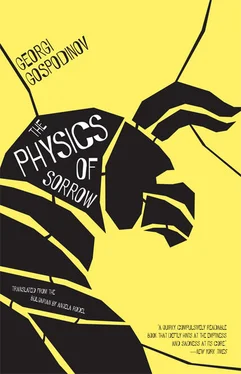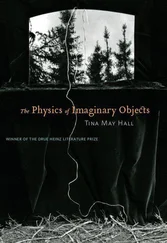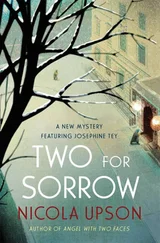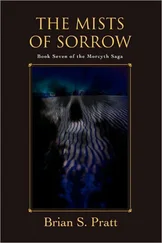You won’t find the youths and maidens devoured by the Minotaur in this list — I don’t believe in that part of the myth. Besides, bulls are herbivores.
P. S.
And one wacky echo in modern times.
It’s an ordinary baking pan, large, with indelible traces of endless use. The rice has been washed and lightly steamed, amid the white — little balls of black pepper. You can clearly see that the stove has been switched on, the oven door is open, and two hands are carrying the tray toward it. There’s just one unusual detail — that’s no chicken or turkey on top of the rice, but a baby, naked and alive. I almost said raw. It’s lying on its back, its arms and legs in the air. It is clearly only a few days old and weighs no more than a middling turkey.
I own this photo (black and white) and the story, bought as a package deal. The woman who received this photo in the mail just about fainted. “Here is your new grandson. Isn’t he sweet?” The letter was from her daughter in Canada, who had sent the first photo of the long-awaited baby. Back when she was little, they used to teasingly tell her: “you’re so sweet, I’m going to eat you up. With rice, with rice. ” It was a family saying. And now, twenty years later, the daughter had decided to literalize the joke.
A myth, deboned, mocked, yet still scary.
THE VOICE OF THE MINOTAUR
The defendant has the floor.
Silence.
Does the defendant have anything to say in his own defense, or does he prefer to remain silent?
The Minotaur’s voice has not been preserved anywhere in all of recorded antiquity. He doesn’t speak, others speak for him. There where everything animate and inanimate refuses to shut up, where the voices of gods and mere mortals, of wood nymphs and heroes, of crafty Odysseuses and naïve Cyclops are constantly swarming, where even the despised Centaurs have the right to speak, only one remains silent. The Minotaur. No voice, no sound, no whimper or threat, nothing anywhere. Not even in the hexameter of Homer, that Minotaur among poets, who in the long nights of his blindness wandered through the labyrinths of history. Nor in Ovid, the exile, who knew very well the fate of an outcast, nor in Vergil, nor in Pliny the Elder, nor in Aeschylus, Euripides, or Sophocles. no one gives voice to, no one preserves the voice of the Minotaur. It’s easy to feel sorry for Icarus, it’s easy to sympathize with Theseus, with Ariadne, even with old King Minos. No one pities the Minotaur.
Does the defendant have anything to say? Otherwise.
He does. Why shouldn’t he be worthy of the heroic hexameter?
THE MINOTAUR’S SPEECH IN HIS OWN DEFENSE (A FRAGMENT)
Some words I have for you o’er which so long I’ve mused
In night’s embrace, O Minos, Hades’ judge most cruel
My tongue has longed to say just once: O father mine!
Yet I discern your scorn and swallow back my cries .
Forsooth! The truth outshines your deepest, darkest fears
Your blood I share — a freak by birth, my lineage’s clear .
Your father’s likeness true, I’m kin to all you all
The first true bull in our damned house was Zeus; recall
how he seduced the fair Europa, dam to you
from Grandpa Zeus I got my bullish form so true .
His very spit and image, to my curving horns ,
As Cretans crones in tales so love to wail and mourn .
A god was he, while I am but a freak; but know
O Minos, father dear, you wanted bulls like snow
so white far more than my sweet mother ever hath
and now you cringe disgusted by your son their calf.
Minos: The court will now break for a recess.
Moooo.
Take away the defendant.
Moooooo.
oooooooooooooooooooooooooooooooooooooooooooooooooo
oooooooooooooooooooooooooooooooooooooooooooooooooo
oooooooooooooooooooooooooooooooooooooooooooooooooo
ASYLUM
A yellow, peeling building, far past the last houses, long and low, with barred windows, the fence girded with barbed wire. An “asylum for the mentally ill,” as they officially called the place, which everyone in that Podunk southeastern town simply called the nuthouse. Rumor had it that the fence was electrified at night and that several people had been fried. I was afraid, yet at the same time it was precisely this fear that drove me to hang around nearby.
One evening, passing by there, I heard a chilling howl. There was something excessive and inhuman in that howling or bellowing, something from the mazes of the night Ooooooooohhh. That endless Oooohh dug tunnels in the silence of the early November evening. It was Sunday. The fallen leaves blanketed the whole street, still emitting a faint scent of rot and acetone, which preceded the corpse of autumn. Only the light above the gate scattered the damp dusk. The nurse had gone home, while the head doctor only came once a week in any case. The porter more or less had to be there, but he was probably dozing drunk in the doctor’s office. In this case, that saved the howler, who would otherwise undergo the traditional ice-cold shower under the garden hose. It was said that they sprayed them with water directly in their rooms (“cells” is the more precise term) through the bars of the window, as a natural curative procedure for cooling down demons. The head doctor had long since made peace with the fact that he would end his career here in this Podunk town. And he didn’t worry about any inspections or sanctions, just as a man who finds himself in hell is freed from the fear that something worse could befall him.
I walked around the yellow house on that Sunday evening, the gloomy corridors of that howl sucking me in ever deeper. I was afraid to enter it, whatever was inside was not fit for the human eye and ear. But my body continued to move mechanically in a circle, I sensed that I was beginning to slip away from myself. Just a bit more and I’ll enter the corridors of the scream, I’ll crawl along the furrows, I’ll embed myself in the body of the screamer.
Just then a hand grabs me firmly by the shoulder; startled, I return to myself like a snail withdrawing into its shell. My father.
Neither of us can hide our surprise at seeing the other in this place. Neither of us has any business being here. And neither of us asks the other what brings him here at this hour. We turn toward the city without a word and sink into the November evening, far from that cry.
I knew that I would never again free myself from the tunnel of that Oooooooohhh. The howl would pursue me throughout the years with varying degrees of doggedness. Appearing and dying away in unexpected situations. Sometimes it would quiet down, I would lose it in my happiest moments, in joyful gatherings with people amid their deafening chatter. But in the next moment of silence it would inevitably appear. And ten years later, when I came down with that constant ringing in my ear, I knew that that howling-bellowing-crying thing was now settled in there for good. In the very center, in the cave of the skull, from there to the tympanic membrane, the hammer and the anvil, in the very labyrinth of the inner ear, as the doctors put it.
THE DIAGNOSIS
Much later, already in my student years, I got up the courage to tell an older doctor friend of mine about the “embedding” that had seized me in childhood. The doctor thought for a long time and finally offered a rare diagnosis, perhaps made up on the spot, which went more or less like this: pathological empathy or obsessive empathetic-somatic syndrome. According to him, the illness was exceedingly rare and incurable, but it peaked in childhood. Over the years the attacks became easier to control and lost their most acute manifestations, without disappearing entirely. Just as in epilepsy, he said, we never know where the person wanders when he is in such a fit.
Читать дальше












